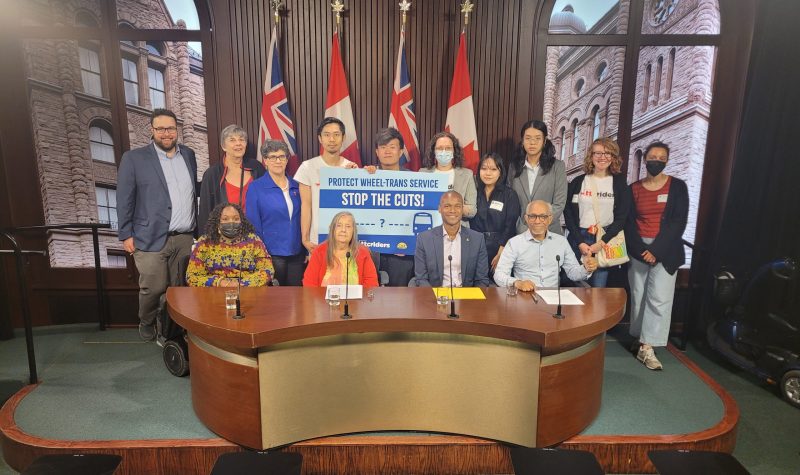Thousands of people with disabilities and seniors in Toronto are facing the potential loss of their access to the TTC’s Wheel-Trans system, the city's para-transit service, during the TTC's ongoing re-registration process.
The TTC is asking users who registered for Wheel-Trans before 2017 to re-register. On Jan. 1, 2017, the TTC added three categories of wheel-trans users for new registrants: temporary, conditional and unconditional riders. The changes were made to comply with the Accessibility for Ontarians with Disabilities Act. When implemented, these categories did not retroactively apply to everyone who applied before 2017. The TTC did not collect enough information of riders who first registered to put them in those categories says Cameron Penman, head of Wheel-Trans.
"We believe it was not fair just to grandfather in these legacy customers who applied before January 2017 and give them all unconditional eligibility. That would not be fair to all these customers who applied since 2017. We also did not believe it was fair to just look at these application that came prior to 2017 and make a determination ourselves as to their eligibility," says Penman.
In a summer 2022 access newsletter, the TTC says that over 7,000 riders re-registered. In the same newsletter it says, “once Wheel-Trans has completed the re-registration of voluntary customers, a mandatory re-registration process will begin starting with customers who are frequent riders.”
As of June, there are over 11,000 former registrants that still need to go through the reregistration process, Penman says, adding that it's estimated that the TTC will take until 2025 to go through all 11,000 people to re-register them.
"Honestly it's depending on how long it takes the individual to fill out the application themselves and get their health care professional to fill out a small section and send it back...we understand that it may take a little longer for our customers and some things can be a little confusing and daunting," says Penman.
Adam Cohoon, a wheel-trans rider, has spastic cerebal palsy and uses a wheelchair. He has to reapply to the program; he uses wheel-trans a few times a month to get to places that are not in short distance to his home. Cohoon says that he had to write a letter describing his disability to the TTC to tell them why he needs to use wheel-trans.
“Luckily, I haven’t lost access to wheel-trans and it was my initial registration…for this round I’m allowed to keep my service but for others they’ve already lost service,” says Cohoon. “It makes people more isolated and causes [disabled or elderly people] to use more of their money on Ubers and taxis.”
When registered, wheel-trans costs riders the adult TTC fare of $3.35.
Eligibility of the program “is not based on disability type, not income or age but solely on the presence of a disability,” writes the TTC on its website. Some re-registration approvals are longer processes than Cohoon's has been. His partner Jennifer Conroy also has spastic cerebal palsy; she was also born without peripheral vision. Conroy’s letter was not approved for renewal and now has to go in for an in-person assessment to get approval for her use of wheel-trans.
“In my case, because I won’t be able to see oncoming cars or anything, if I were to board a streetcar for example, that would be very difficult for me to be able to do safely,” says Conroy.
Both Cohoon and Conroy have been using the wheel-trans service for over 20 years. Cohoon says that while the service fluctuates in quality, it is still an essential service for those who use it. He says that wheel-trans is a service that connects people and helps prevent loneliness and isolation that is common in the disability community.
“A lot of the disability community has people on the margin and I feel burned out. We’re the one dealing with all the cuts to our income, all the financial barriers, all the systemic barriers. Rather than making things easier for us it only gets worse,” says Cohoon.
While the registration process is still underway, Cohoon says that he knows 20 people who have lost their access to wheel-trans. He says that losing access to wheel-trans is the same as if everyone else lost access to the TTC.
“Some will use it for work and medical appointments, even grocery shopping. It depends on where they live and if they have access to be able to move around,” says Cohoon.
He says that the reregistration process is them having to prove how disabled they are. Cohoon says the process is psychologically degrading .
“It’s very disheartening because we spend our lives proving to people that we are so much more than our disabilities,” says Conroy. “In this case, we have had to play up our disabilities a little bit so that they understand that you need it,” he said.
Penman does not completely agree with Cohoon and Conroy when it comes to having to prove their disabilities. The registration process to to be "fair and equitable" to riders who registered post-2017, Penman adds.
"I understand and I can be empathetic to this. I understand there's anxiety involved with it," says Penman. "We are absolutely not [asking them to prove their disability]. There's a reason why everyone has access and applied for and was accepted into the wheel transit service. We understand that you have a disability and have barriers to using the conventional transit system, we totally understand."
Listen to the CJRU story below:


